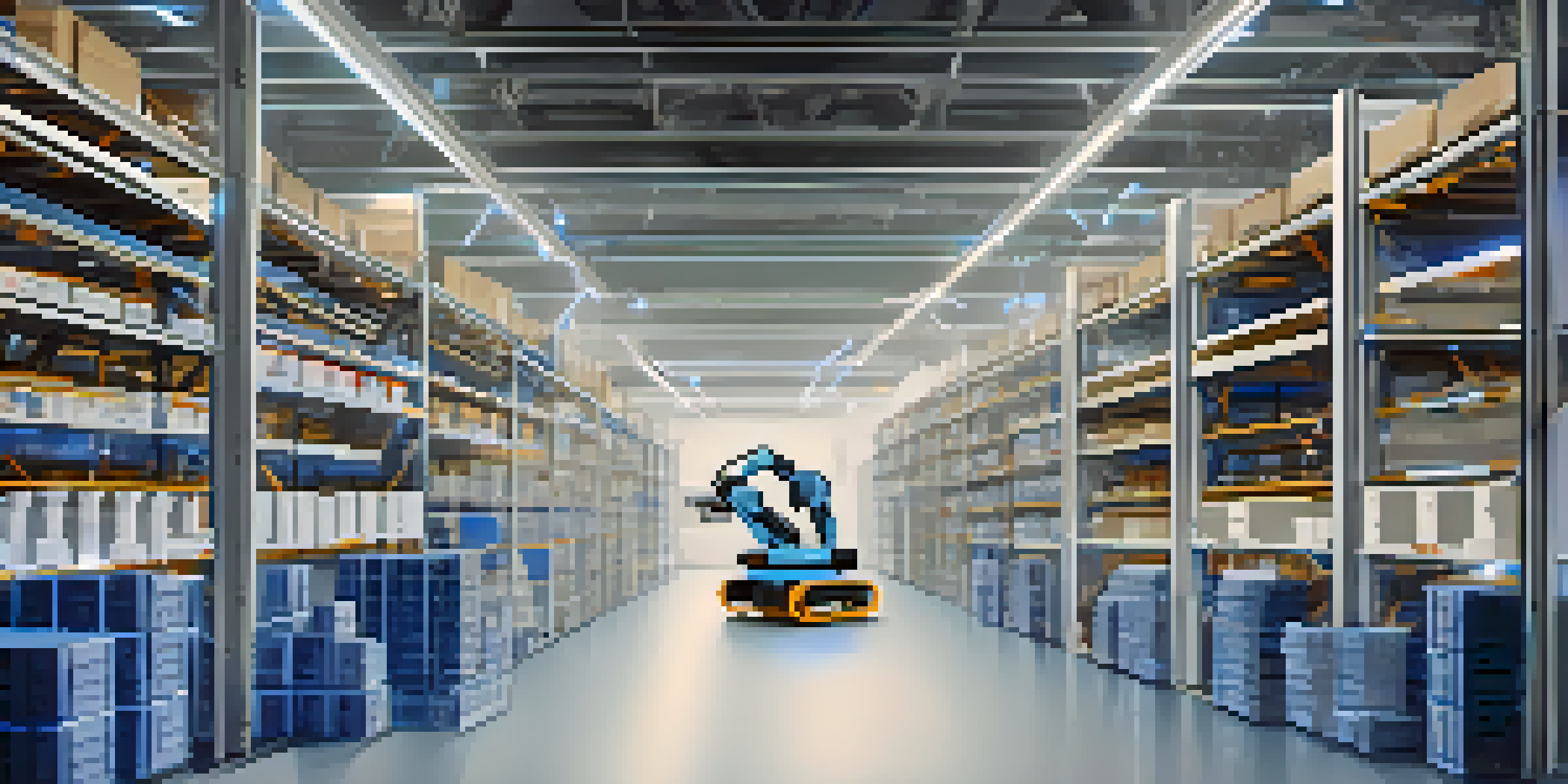The Role of Artificial Intelligence in Supply Chain Optimization

Understanding Supply Chain Optimization and Its Importance
Supply chain optimization involves refining the flow of goods and services to maximize efficiency and minimize costs. It's crucial for businesses to enhance customer satisfaction while maintaining profitability. In today's fast-paced market, a well-optimized supply chain can be a game changer, giving companies a significant competitive edge.
The supply chain is the backbone of any business, and optimizing it can lead to significant gains in efficiency and customer satisfaction.
As consumer expectations continue to rise, ensuring timely delivery and product availability is essential. Companies that fail to optimize their supply chains may face delays, increased operational costs, and ultimately, dissatisfied customers. Therefore, understanding the essential components of supply chain optimization is the first step toward improvement.
Artificial intelligence (AI) steps in as a powerful tool that can analyze vast amounts of data, offering insights that human decision-makers might overlook. By leveraging AI, companies can foresee demand fluctuations, manage inventories better, and streamline logistics—all crucial elements of supply chain optimization.
AI's Role in Demand Forecasting for Supply Chains
Accurate demand forecasting is the backbone of effective supply chain management. AI systems can analyze historical sales data, market trends, and even social media sentiment to predict future demand with remarkable precision. This predictive capability allows businesses to align their production schedules and inventory levels with actual market needs.

For instance, a clothing retailer can use AI algorithms to analyze past fashion trends and upcoming seasonal changes, ensuring they stock the right styles in the right quantities. This not only reduces the risk of overstocking but also minimizes lost sales due to stockouts. With AI, companies can make data-driven decisions that lead to smarter inventory management.
AI Enhances Supply Chain Efficiency
Artificial intelligence optimizes demand forecasting, inventory management, and logistics operations, leading to reduced costs and improved customer satisfaction.
Ultimately, improved demand forecasting leads to reduced waste and increased customer satisfaction. By ensuring that the right products are available when customers want them, businesses can enhance their reputation and strengthen customer loyalty—key components of long-term success.
Enhancing Inventory Management through AI Technology
Inventory management is another area where AI shines, helping companies track stock levels and optimize reorder points. AI-driven systems can provide real-time data, enabling businesses to make informed decisions about when to replenish inventory and how much to order. This proactive approach prevents excess stock and associated carrying costs.
Artificial intelligence is the new electricity. It has the potential to transform every industry and is particularly powerful in supply chain management.
For example, a grocery store can utilize AI to monitor inventory levels of perishable goods, automatically triggering reorder alerts as items approach their expiration dates. This not only minimizes waste but also ensures customers find fresh products on the shelves. The efficiency gained through AI in inventory management can lead to significant cost savings.
Moreover, AI can identify trends and patterns that may not be immediately obvious to human managers. By analyzing sales velocity and seasonal variations, AI can recommend optimal stock levels for different products, further enhancing inventory efficiency and reducing operational headaches.
Utilizing AI for Enhanced Supplier Relationship Management
Strong supplier relationships are vital for a resilient supply chain, and AI can help facilitate these connections. By analyzing supplier performance data, AI can identify which suppliers consistently meet quality and delivery standards, allowing businesses to make informed decisions about whom to partner with. This ensures that companies work with reliable suppliers who contribute positively to their supply chain.
Moreover, AI tools can streamline communication with suppliers, automating processes such as order placement and invoice processing. This not only saves time but also minimizes the risk of human error, leading to smoother operations. A more efficient collaboration with suppliers can ultimately lead to better pricing and improved terms.
Strengthening Supplier Relationships
AI facilitates better supplier management by analyzing performance data and streamlining communication, ultimately enhancing collaboration and reducing risks.
In addition, AI can help businesses assess risks within their supply chains, such as potential disruptions due to geopolitical issues or natural disasters. By staying ahead of these challenges, companies can develop contingency plans and maintain strong supplier relationships even in uncertain times.
Streamlining Logistics Operations with AI Solutions
Logistics is a critical component of supply chain management, encompassing everything from transportation to warehousing. AI can optimize logistics operations by analyzing routes, delivery schedules, and even traffic patterns. This allows companies to reduce shipping costs and improve delivery times, which are essential for customer satisfaction.
For instance, a delivery service can use AI to determine the most efficient routes for drivers, taking into account real-time traffic data. This not only saves fuel costs but also ensures timely deliveries, enhancing the company's reputation. Efficient logistics operations can set a brand apart in a competitive market.
Additionally, AI can enhance warehouse management by optimizing space utilization and automating order fulfillment processes. With AI-powered robotics, warehouses can operate more efficiently, reducing the time it takes to pick, pack, and ship products, ultimately leading to a faster turnaround for customers.
Achieving Supply Chain Resilience through AI Insights
Supply chain resilience refers to a company's ability to adapt to disruptions and maintain operations. AI plays a crucial role in building this resilience by providing insights that help organizations anticipate and respond to potential challenges. By analyzing data from various sources, AI can identify vulnerabilities in the supply chain and suggest proactive measures.
For example, if a company relies heavily on a single supplier, AI can flag this as a potential risk and recommend diversifying the supplier base. This allows businesses to maintain continuity even if one supplier faces difficulties. Building a resilient supply chain is essential in today's unpredictable environment.
Building Resilience with AI Insights
AI provides insights that help companies anticipate disruptions and prepare contingency plans, ensuring supply chain resilience in unpredictable environments.
Furthermore, AI can enhance scenario planning by simulating various disruption scenarios and their potential impacts on the supply chain. This helps companies prepare for the unexpected, ensuring that they can bounce back quickly and effectively when challenges arise.
The Future of AI in Supply Chain Management
As technology continues to evolve, the role of AI in supply chain management will only grow more significant. Advancements in machine learning and data analytics will allow businesses to gain deeper insights and improve decision-making processes. Companies that embrace these innovations will likely stay ahead of the curve, adapting to changes in the market more effectively.
Moreover, as AI becomes more accessible, even small and medium-sized enterprises can leverage its benefits. With user-friendly AI tools, these businesses can optimize their supply chains without needing extensive resources. The democratization of AI will level the playing field, allowing all companies to compete more effectively.

Ultimately, the future of supply chain management lies in the integration of AI technologies. By fostering collaboration between humans and machines, businesses can create agile and efficient supply chains that meet the demands of an ever-changing marketplace.